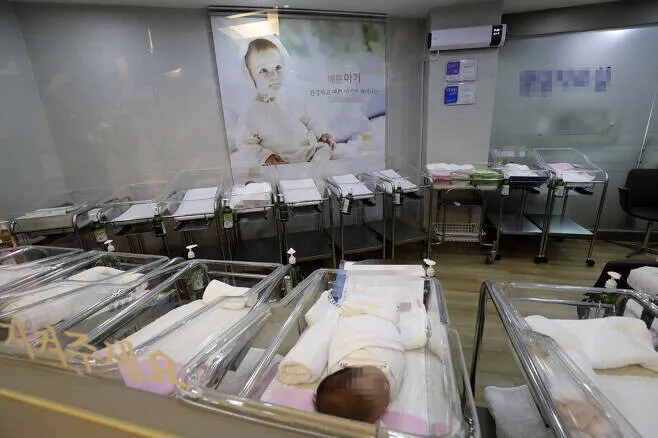hankyoreh
Links to other country sites 다른 나라 사이트 링크
Hankyoreh to host Asia Future Forum on ‘Shrinking Societies with Low Fertility Rates: How to Respond?’

The Hankyoreh will host the Asia Future Forum on Oct. 24, as part of an ongoing quest to build a better world and pursue sustainable development. Now in its 15th year, next month’s forum seeks to answer the questions of “Shrinking Societies with Low Fertility Rates: How to Respond?”
Last year, South Korea’s birth rate dropped to 0.72 — the lowest in the world. The population has been shrinking for four years, and experts predict that the current population of over 50 million could fall to around 30 million in the next 40 years.
This unprecedented decline in birth rates can be attributed to deeply rooted gender inequality, coupled with a culture of anxiety and intense competition. The forum will bring together top experts from Korea and abroad to tackle these structural challenges and explore ways to build a more sustainable community.
In the morning session, Nancy Folbre, professor emeritus of economics at the University of Massachusetts Amherst and a leading figure in theorizing the “care economy” — which argues that unpaid care work, traditionally performed by women, should be included in economic measures — will deliver a keynote speech titled “Finding a Solution to the Low Birth Rate in Transitioning to a Care Economy.”
Prior to that, Kim Hyun-mee, a professor of cultural anthropology at Yonsei University known for her sharp insights into social issues, will present “What Caused the Crisis in Reproductive Structures?” focusing on the unique factors driving South Korea’s ultra-low birth rate.
Alan Mallach, an urban planning expert and senior research fellow at the US-based Center for Community Progress who published the book “Smaller Cities in a Shrinking World,” will be taking part in a special roundtable on the theme of declining population and transforming the global paradigm.
Chang Kang-myoung, one of Korea’s leading novelists of the generation, will be speaking on the topic of exhausted young people leaving Korea because they “hate” it, as he wrote about in his book “Because I Hate Korea.” This presentation will adopt a conversation format to address the anxieties among young people that underlie the low birth rate phenomenon.
The afternoon session will feature a talk by Karen Eggleston, director of Stanford University’s Walter H. Shorenstein Asia-Pacific Research Center, and Lee Sang-heon, the director of the International Labor Organization’s employment policy department. Eggleston, who has researched changes in East Asian demographic structures, will be speaking on the topic of rapid industrialization and low birth rates in East Asia, while Lee will be discussing changes in the labor market and birth rate.
Masanori Yoshino, a senior project manager at the Hitachi Center for Exploratory Research, will be presenting on examples of Japan’s efforts to resolve population-related issues.
Finally, the afternoon will include two specialized sessions, which respectively examine the low birth rate issue from a standpoint of regional destruction and the increasingly prolonged transitional period from adolescence to adulthood.
For more about the forum, visit https://asiafutureforum-en.imweb.me/
Please direct questions or comments to [english@hani.co.kr]

Editorial・opinion
![[Editorial] Former first lady’s indictment is consequence of her acting as though she were president [Editorial] Former first lady’s indictment is consequence of her acting as though she were president](https://flexible.img.hani.co.kr/flexible/normal/500/300/imgdb/original/2025/0901/8217567182191594.jpg) [Editorial] Former first lady’s indictment is consequence of her acting as though she were president
[Editorial] Former first lady’s indictment is consequence of her acting as though she were president![[Correspondent’s column] A report card for the Lee-Ishiba summit [Correspondent’s column] A report card for the Lee-Ishiba summit](https://flexible.img.hani.co.kr/flexible/normal/500/300/imgdb/original/2025/0829/6917564570694471.jpg) [Correspondent’s column] A report card for the Lee-Ishiba summit
[Correspondent’s column] A report card for the Lee-Ishiba summit- [Editorial] America’s penchant for plundering allies
- [Editorial] Kim Jong-un’s return to diplomacy could be the start of a tectonic shift
- [Editorial] Lee clears first hurdle with Trump, but the race is not over yet
- [Column] Slow-motion authoritarianism
- [Guest essay] The silent calculus behind world leaders’ flattery of Trump
- [Editorial] Lee’s concessions to Japan on history, security leave bitter taste
- [Editorial] ‘Yellow Envelope Act’ is a new chapter in Korean labor rights
- [Column] The era of playing both ends against the middle
Most viewed articles
- 1Why Kim Jong-un opted for a 20-hour train ride to Beijing
- 2Korean chipmakers seek exit strategy from China as Trump tightens export controls
- 3[Column] How Seoul can serve as ‘pacemaker’ for US and North Korea
- 4[Editorial] Seoul could learn from Pyongyang’s overtures to Beijing
- 5Kim Keon-hee, wife of Yoon Suk-yeol, appears before special counsel
- 6Hanbok vs. funeral attire: Fashion highlights political divide as legislative session kicks off
- 7Xi takes swipe at Trump’s ‘bullying’ at SCO security summit
- 8Kim boasts ICBMs before meeting Xi and Putin in Beijing
- 9[Editorial] Former first lady’s indictment is consequence of her acting as though she were president
- 10[Editorial] America’s penchant for plundering allies